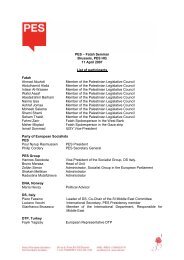Hedge funds and Private Equity - PES
Hedge funds and Private Equity - PES
Hedge funds and Private Equity - PES
Create successful ePaper yourself
Turn your PDF publications into a flip-book with our unique Google optimized e-Paper software.
178<br />
5. Our immediate proposals<br />
In the past two decades we have seen an increasing uncoupling of the well-known relationship<br />
between wage increases <strong>and</strong> productivity. Now productivity continues to grow without wages<br />
keeping pace. This is an expression of the changes connected to the new developments on the<br />
financial markets.<br />
The increased subordination of real economic investments – to promote New Social Europe –<br />
to the global financial markets, is underlining the need for proper regulation.<br />
Even more fundamentally, the efforts of the European Union to strengthen the role of the social<br />
partners is weakened through the shifting coalition of investors whose only reference is the financial<br />
markets. Many leveraged buy-outs imply that there is no longer any interest in improvements<br />
in production or services, increased sustainable productivity capacity, innovation <strong>and</strong> research,<br />
long-term viability of markets, consumer needs etc. On the contrary: every investment is viewed<br />
as a portfolio of financial assets, not a place of employment.<br />
This situation has been developing slowly but steadily over decades, with private equity playing<br />
an increasing role, certainly in Europe. Into this environment have now been injected enormous<br />
<strong>funds</strong> offering rates of return unthinkable only recently. The buyout <strong>funds</strong> have grown so big <strong>and</strong><br />
so active that virtually all companies, no matter how big themselves, are effectively functioning in<br />
a pre-bid environment. This not only means that they respond to the real threat of an actual<br />
takeover bid by typically resorting to mass layoffs, wage reductions, extensions of working hours,<br />
casualisation etc. to show shareholders that they are serious about “delivering value” but also<br />
means that there is constant pressure on all firms to deliver greater profits, while investing less<br />
in the future of the companies through expansion of the capital stock. The trend is most visible<br />
in North America, but Europe follows the same curve, as a result of which the social model <strong>and</strong><br />
the financing of the long-term Lisbon-investments (ref. Lisbon-European Council 2000) are under<br />
pressure. The drain on resources away from productive investment to reward purely financial<br />
investors is one of the key elements in severing the link between wages, profits <strong>and</strong> productivity<br />
<strong>and</strong> fostering the growth of social inequality.<br />
Viewed from the st<strong>and</strong>point of the “financialisation” of the economy as a whole, <strong>and</strong> the regulation<br />
of “alternative investments” in particular, the goal of regulation should be to reverse this levy,<br />
discourage the rising distribution of profits to purely financial actors <strong>and</strong> encourage long-term<br />
investments which contribute to the growth <strong>and</strong> development of sustainable employment.<br />
<strong>Private</strong> equity is acting as a financial magnet taking investment capital in exactly the opposite<br />
direction. As such, it should clearly be identified as a menace to the European social model. This<br />
analysis is borne out by the case studies <strong>and</strong> the analysis in Part II, which is a devastating portrait<br />
of the impact of private equity <strong>and</strong> illustrates the ways in which private equity smashes the<br />
wages/productivity link.<br />
EU-wide regulation of alternative investment should orient itself towards balancing the in principle<br />
desired financing of enterprises, in whatever form, between the three poles of free capital movement<br />
– 1)investor protection <strong>and</strong> freedom to choose <strong>and</strong> pursue a career, 2) corporate governance<br />
<strong>and</strong> 3) society’s interest in maintaining or increasing the value of enterprises over the long term.<br />
Undesirable investment strategy, which aims at short-term leveraging of the investors’ own capital<br />
as well as that of enterprises, should be hindered by European regulation.. So should very shortterm<br />
investment with rapid ‘exit’, or the avoidance of st<strong>and</strong>ards of investor protection or which result




